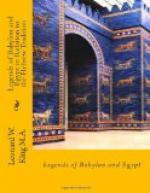(. . .)lugal, son of Gishbilgames, ruled for (. . .) years.
(1) The verb may also imply descent into.
(2) The phrase appears to have been imperfectly copied by the scribe. As it stands the subordinate sentence reads “the king of Erech who built with the people of Erech”. Either the object governed by the verb has been omitted, in which case we might restore some such phrase as “the city”; or, perhaps, by a slight transposition, we should read “the king who built Erech with the people of Erech”. In any case the first building of the city of Erech, as distinguished from its ancient cult-centre Eanna, appears to be recorded here in the tradition. This is the first reference to Erech in the text; and Enmerkar’s father was high priest as well as king.
(3) i.e. Tammuz.
(4) i.e. Gilgamesh.
(5) The name of the father of Gilgamesh is rather strangely expressed by the single sign for the vowel a and must apparently be read as A. As there is a small break in the text at the end of this line, Dr. Poebel not unnaturally assumed that A was merely the first syllable of the name, of which the end was wanting. But it has now been shown that the complete name was A; see Foertsch, Orient. Lit.-Zeit., Vol. XVIII, No. 12 (Dec., 1915), col. 367 ff. The reading is deduced from the following entry in an Assyrian explanatory list of gods (Cun. Texts in the Brit. Mus., Pt. XXIV, pl. 25, ll. 29-31): “The god A, who is also equated to the god Dubbisaguri (i.e. ’Scribe of Ur’), is the priest of Kullab; his wife is the goddess Ninguesirka (i.e. ’Lady of the edge of the street’).” A, the priest of Kullab and the husband of a goddess, is clearly to be identified with A, the priest of Kullab and father of Gilgamesh, for we know from the Gilgamesh Epic that the hero’s mother was the goddess Ninsun. Whether Ninguesirka was a title of Ninsun, or represents a variant tradition with regard to the parentage of Gilgamesh on the mother’s side, we have in any case confirmation of his descent from priest and goddess. It was natural that A should be subsequently deified. This was not the case at the time our text was inscribed, as the name is written without the divine determinative.
(6) Possibly 186 years.
This group of early kings of Erech is of exceptional interest. Apart from its inclusion of Gilgamesh and the gods Tammuz and Lugalbanda, its record of Meskingasher’s reign possibly refers to one of the lost legends of Erech. Like him Melchizedek, who comes to us in a chapter of Genesis reflecting the troubled times of Babylon’s First Dynasty,(1) was priest as well as king.(2) Tradition appears to have credited Meskingasher’s son and successor, Enmerkar, with the building of Erech as a city around the first settlement Eanna, which had already given its name to the “kingdom”. If so, Sumerian tradition confirms the assumption of modern




